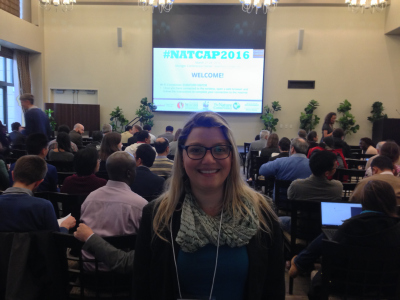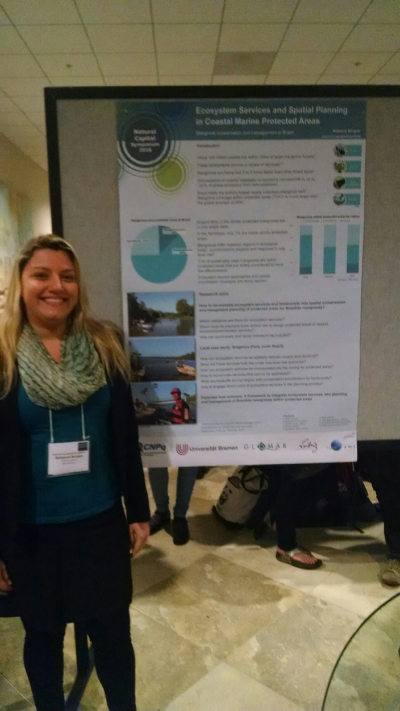Die Inhalte dieser Seite sind leider nicht auf Deutsch verfügbar.
Seitenpfad:
Rebecca Borges
Report of GLOMAR PhD student Rebecca Borges about her participation in the Natural Capital Symposium 2016 Stanford University in California, USA from 21 – 24 March 2016
The Symposium took place at Stanford University, California (US), March 21-24, 2016. The aim of the meeting was to bring together different actors interested in natural capital approaches, giving this growing community a further chance to engage, learn, and adapt.
Natural capital is represented by ecosystem services - the benefits provided by nature to human being. The Natural Capital Project, the Symposium’s organizer based at Stanford, works to include ecosystem services in research, policy and decision-making in a variety of ways, e.g., by developing modelling software and directly engaging with governments and other educational institutions to carry on conservation projects which apply the ecosystem service approach and aim to generate conservation benefits to people and nature.
In order to support this work, the Natural Capital Symposium took place across three simultaneous tracks
Natural capital is represented by ecosystem services - the benefits provided by nature to human being. The Natural Capital Project, the Symposium’s organizer based at Stanford, works to include ecosystem services in research, policy and decision-making in a variety of ways, e.g., by developing modelling software and directly engaging with governments and other educational institutions to carry on conservation projects which apply the ecosystem service approach and aim to generate conservation benefits to people and nature.
In order to support this work, the Natural Capital Symposium took place across three simultaneous tracks
- Pathways to Impact: highlighted engagements where natural capital information has had an impact on a decision, a stakeholder process, or an outcome.
- Learning Exchange: featured in-progress, theoretical, and experimental work, still on the way to finding its impact, maximizing information sharing between participants.
- Training: a 3-day course in the Natural Capital Approach and the primary software tools.
I dedicated most of my time to the Training track and learned about the application of the ecosystem service modelling software InVEST (Integrated Valuation of Ecosystem Services and Tradeoffs). I had hands-on sessions and tutoring on my PhD project, specifically on how to better formulate my research questions and how to apply InVEST and others tools, which were recommended to help me with my analyses.
During my poster presentation, I received suggestions from experts, who helped me figure out some methodological questions I had about my project. Peer researchers and actors from non-profit organizations gave me precious insights on the research I develop at the moment. I also had the opportunity to connect with experts and peers working on ecosystem services throughout the whole event, including German researchers who are also interested in using InVEST. Future partnerships are now being planned in order to facilitate a course on the Natural Capital tools in Germany.
I would therefore strongly recommend future Natural Capital events for those who are interested in doing research on or applying in policy and decision-making the ecosystem service approach, especially those who plan to use the software toolkit developed by the Natural Capital Project.
I would like to thank the Bremen International Graduate School for Marine Sciences (GLOMAR) and the University of Bremen for funding my participation at the Natural Capital Symposium.
During my poster presentation, I received suggestions from experts, who helped me figure out some methodological questions I had about my project. Peer researchers and actors from non-profit organizations gave me precious insights on the research I develop at the moment. I also had the opportunity to connect with experts and peers working on ecosystem services throughout the whole event, including German researchers who are also interested in using InVEST. Future partnerships are now being planned in order to facilitate a course on the Natural Capital tools in Germany.
I would therefore strongly recommend future Natural Capital events for those who are interested in doing research on or applying in policy and decision-making the ecosystem service approach, especially those who plan to use the software toolkit developed by the Natural Capital Project.
I would like to thank the Bremen International Graduate School for Marine Sciences (GLOMAR) and the University of Bremen for funding my participation at the Natural Capital Symposium.




